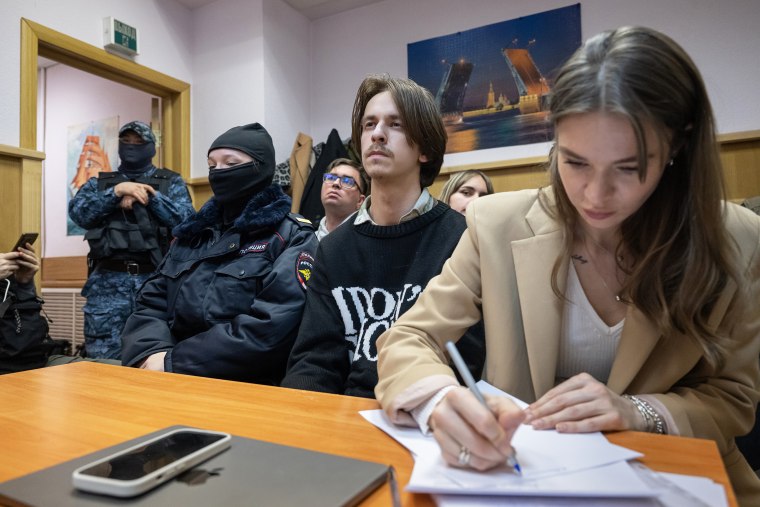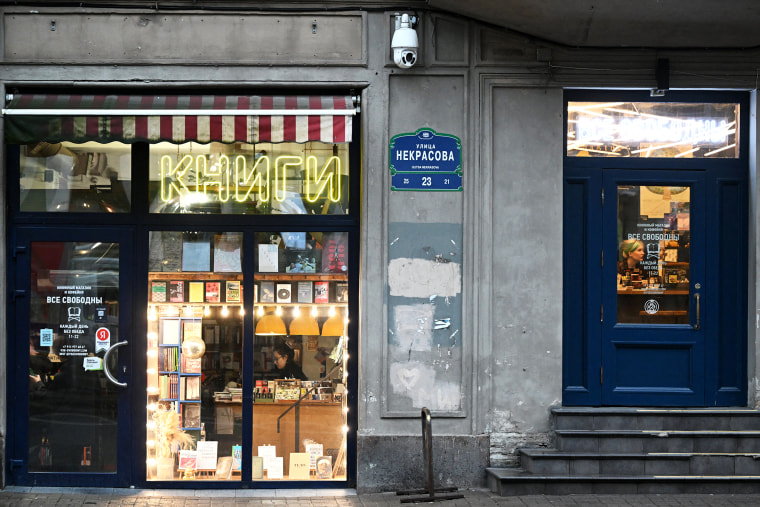Dozens of young people wave flashlights on their phones and sing along to a girl as she shouts lyrics and plays on a keyboard outside a subway station.
This scene plays out regularly in cities around the world. But the singer in the widely circulated video is now behind bars.
Diana Loginova, an 18-year-old student and street musician, has become an unexpected—and perhaps unwitting—voice of defiance in Wartime Russia.
Known by her stage name Naoko, she gained popularity over the summer thanks to viral videos shot in St. Petersburg of her band Stoptime performing songs by musicians who protested against Vladimir Putin's war in Ukraine. Inevitably, in a country where almost all forms of dissent are suppressed, Russian authorities were quick to take notice.
Naoko was first detained last month for organizing a “simultaneous mass gathering of citizens” during a speech that authorities said disrupted public order, and was sentenced to 13 days in prison. Since then she has been re-arrested twice on the same charges, as well as for petty hooliganism, and put back in prison. Her bandmates also served consecutive sentences, although one of them was subsequently released.
“What’s happening is what we call carousel arrests,” Dmitry Anisimov, a human rights activist and spokesman for the protest monitoring group OVD-Info, told NBC News. “Theoretically, this could go on forever,” he said. In practice, this could mean months of detention, and there is legal precedent for this, he added.
“It appears that Russian authorities want to use Naoko’s prosecution, like many other public cases, to intimidate others,” Anisimov said.
Loginova's lawyer, Maria Zyryanova, told NBC News that she will not discuss the case while the singer is behind bars. Her current term expires on Sunday.
Naoko's case was widely covered by Russian state news agencies and independent media in exile, with supporters distributing leaflets calling for her release.

In an interview published in August, months before her imprisonment, Naoko said she was “afraid” of being detained but felt she “had to do it.”
“I understand that art is now the only language – at least in Russia – in which you can express your thoughts. I chose it and don’t want to speak any other,” She said St. Petersburg information publication “Paper”.
Others picked up this formulation in Loginova's absence.
On a bench near the Kievskaya metro station in central Moscow, musician Vasily told NBC News that Naoko's case “lit a fire in him,” inspiring him to do his own street performances in support of the jailed singer.
“Her freedom was taken away for singing,” said Vasily, whose last name NBC News chose not to disclose for his safety. “It made me angry.”

Valentina, a professional musician from the city of Yaroslavl, about 380 miles southeast of St. Petersburg, sang both in the streets and on social media in support of Naoko.
Inspired by Naoko's TikTok performance, she posts videos of herself performing the same songs. One of them received more than 600,000 views on Instagram, which scared her because she did not want to come to the attention of the authorities, said Valentina, who did not want her last name revealed for fear of reprisals. “When I saw the news about Naoko, I felt like my last hope was taken away,” she said. “I didn’t feel sorry for myself. I just really wanted to help. I thought: “Why am I scolding people who are silent and don’t say anything in our country, when I am also silent and afraid?”
Loginova is still a child, noted Vasily, he is only 19. “What touched people is that this little girl is not afraid to go out into the streets and sing songs of foreign agents.”
He refers to the status of exiled singer Monetochka and rapper Noize MC, who have been given an official title often given to public figures whose views have put them at odds with the Kremlin.
It was a song by Noize MC, who openly opposed the war and Putin's regime, which Loginova performed before she first went to prison.

The rapper's words that seem to have gotten her into the most trouble seem harmless at first glance: “I want to see the ballet, let the swans dance.”
This is a reference to the failed 1991 coup attempt against the last Soviet leader, Mikhail Gorbachev, during which state television continuously showed the Swan Lake ballet. Since then, it has become a symbol of something dangerous in Putin's Russia: change.
A video of a cover of the band's song, which Loginov said they performed rarely and not in front of cameras, drew the ire of war supporters who questioned why the band was allowed to perform songs of “traitors” and whether their performances were actually covert protests.
A representative for the Noize MC said in an email that the rapper “prefers not to give interviews or public comments on this case – primarily to avoid any risk of unintended exposure to those directly involved.”
Monetochka, whose songs the group also performed, called them “heroes” in a statement on social networks, saying that Loginova brings “music and freedom” to the world, and not “violence and war.” She did not respond to NBC News' request for comment.
NBC News has reached out to Kremlin spokesman Dmitry Peskov for comment on the case.
Kremlin critic Boris Nadezhdin, who was prohibited from running against Putin During last year’s elections, he said that he had communicated with Loginova’s mother, Irina, and raised funds to cover the group’s legal costs.
He also raised awareness on social media and said people's emotional response was palpable. “She is young, she is a woman, and she is not a politician or a journalist at all. People are accustomed to repression against opposition politicians and journalists, but this is a new low,” Nadezhdin said.
The people who came to hear the group were also young, he said, a worrying sign for the Kremlin as its support base is predominantly older. “So they need to do an exemplary killing of some young singer,” he said, “so that others will be afraid.”
Despite attracting sympathy at home and abroad, Loginova remains behind bars because of her singing. Nadezhdin said he was not optimistic about her chances of performing again anytime soon.
“They won't leave her alone quickly,” he said. “I tell them to prepare for a long trip.”








